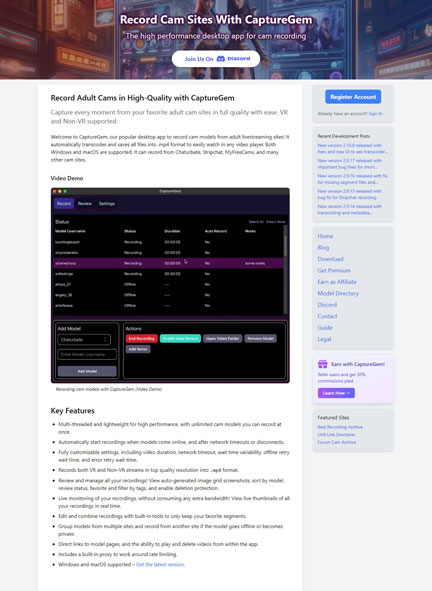Recording content from platforms like CamSoda might seem harmless when done for personal use, but it opens up a set of legal and ethical considerations that many users overlook. As adult content streaming involves personal performances and user privacy, you must be extremely cautious about how, why, and what you record. In this article, we’ll explore the legal boundaries and smart practices to follow when using a CamSoda recorder, ensuring that your actions remain within acceptable limits.
Understanding CamSoda’s Terms of Service
First things first—CamSoda’s official policy clearly prohibits unauthorized recording of streams, whether public or private. Violating these terms may lead to:
-
Account suspension or ban
-
Loss of access to purchased content
-
Potential legal notices from performers or the platform
So, if you plan to record, make sure your actions comply with both platform policies and local laws.
When Recording is Acceptable
There are a few limited scenarios where recording from CamSoda may be acceptable:
-
With Performer’s Consent: If you’re in a private show and the performer explicitly agrees to being recorded for your personal viewing only.
-
For Educational or Review Purposes: If you’re a model or coach using your own content for analysis or performance improvement.
-
Offline Backup: For users in regions with unstable internet, recording for temporary offline viewing might be tolerated if it’s not shared or distributed.
In each of these cases, transparency and consent are key.
Why Consent is Crucial
Even in private one-on-one sessions, recording without informing the other party may be considered a breach of privacy and could lead to:
-
Legal repercussions based on your jurisdiction
-
Damage to your reputation
-
Bans from multiple platforms, especially if reported by performers
Using a CamSoda recorder without clear communication can backfire quickly, so play it safe.
Tools That Respect Privacy
Ethical recording tools:
-
Do not auto-upload files to cloud storage
-
Provide local-only saving
-
Avoid injecting watermarks or ads
-
Offer clear user control for start/stop features
For safe and reviewed tools, check out:
👉 https://www.capturegem.com/guide/record-from-camsoda
Legal Risks of Sharing Recorded Content
Sharing even a small clip without permission can result in:
-
DMCA takedown notices
-
Civil lawsuits from performers
-
Criminal charges, especially in countries with strict data or privacy laws
Never post, resell, or send CamSoda recordings—even in private messaging—unless the content was yours or you have written permission.
Conclusion
Recording from CamSoda isn’t just a technical action—it’s a responsibility. Whether you’re doing it to save a memorable stream or analyze your own performance, always follow the rules, protect performer privacy, and avoid distributing content. For step-by-step guides and approved tools that keep your recordings safe and legal.











